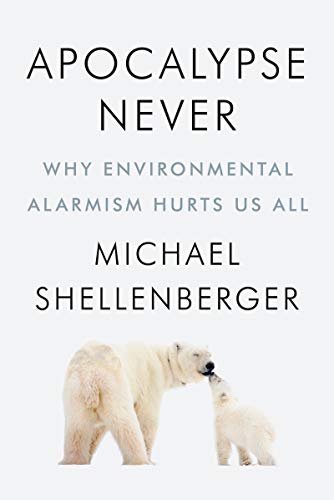By Michael Shellenberger
Introduction: Rethinking the Climate Crisis
In Apocalypse Never: Why Environmental Alarmism Hurts Us All, author and environmental activist Michael Shellenberger makes a bold and controversial claim: climate change is real—but it’s not the end of the world.
Shellenberger argues that the current narrative of environmental apocalypse is overblown, misleading, and counterproductive. Drawing on decades of experience in energy and environmental advocacy, he suggests that alarmism has distorted public policy, diverted resources from real issues, and ironically harmed the people and ecosystems it aims to protect.
Rather than deny climate change, Apocalypse Never offers a fact-based, optimistic, and human-centered approach to environmental stewardship.
The Core Message: Truth Over Fear
Shellenberger opens with a confession: as a long-time environmentalist and founder of Environmental Progress, he has contributed to the fear-based messaging that dominates the climate conversation. But now, he believes it’s time to set the record straight.
“No, climate change isn’t going to end civilization. Yes, we should still act—but with reason, not panic.”
He contends that scaring people into action has backfired, leading to poor policy decisions, energy poverty, and public fatigue.
Key Themes and Takeaways
1. Climate Change Is Real—But Manageable
Shellenberger does not deny climate change. However, he emphasizes that:
- Climate models have wide uncertainty ranges.
- Predictions of “climate apocalypse” are based on worst-case scenarios, not most likely ones.
- We are more resilient than ever thanks to technology, modern agriculture, and urban infrastructure.
He argues that media and activist groups often cherry-pick data and use emotionally manipulative language that clouds rational discussion.
💡 Takeaway: Climate change is a problem, but not an existential crisis.
2. Fossil Fuels Lifted Billions from Poverty
While acknowledging the downsides of fossil fuels (pollution, greenhouse gases), Shellenberger emphasizes their role in:
- Powering industrial growth
- Providing cheap and reliable energy
- Enabling development in the Global South
He warns that shutting down fossil fuel projects without viable alternatives will hurt the poor the most—especially in Africa and Asia.
💡 Takeaway: Energy access is a human right. Energy transitions must consider economic realities.
3. The Renewable Energy Illusion
Shellenberger critiques the romanticization of renewables:
- Solar and wind are intermittent, requiring backup energy or large-scale storage (which remains expensive).
- Renewables require vast land use, which can harm biodiversity.
- They often rely on mining rare earth metals and result in short-lived infrastructure.
He believes that an overreliance on renewables can undermine grid stability and ironically increase emissions when paired with coal or natural gas.
💡 Takeaway: Renewables have a role, but they are not a silver bullet.
4. The Case for Nuclear Energy
One of Shellenberger’s central arguments is that nuclear power is the safest, cleanest, and most scalable energy source available:
- Produces zero emissions
- Requires less land than renewables
- Has a strong safety record (even post-Fukushima)
So why isn’t it more popular? He blames:
- Regulatory hurdles
- Misconceptions about radiation risks
- Environmentalist opposition rooted in fear, not facts
💡 Takeaway: If we’re serious about decarbonization, we must embrace nuclear power.
5. Environmental Alarmism Hurts More Than It Helps
Shellenberger explores how alarmist rhetoric can:
- Paralyze people with fear
- Cause eco-anxiety, especially in young people
- Lead to counterproductive policies (e.g., banning plastic straws while ignoring industrial waste)
- Divert resources from more pressing issues like poverty, disease, and malnutrition
He argues that fear-based messaging undermines public trust and leads to emotional fatigue, not action.
💡 Takeaway: Hope, not fear, drives sustainable and effective change.
6. Misguided Conservation Efforts
Shellenberger highlights how well-intentioned but misguided conservation efforts have harmed communities and ecosystems:
- “Fortress conservation” has displaced Indigenous people from their lands.
- Anti-meat campaigns ignore the role of regenerative agriculture and local food systems.
- Deforestation is often driven by poverty, not greed—and energy access helps reduce it.
He suggests that empowering local communities with technology, education, and markets is more effective than top-down environmental restrictions.
💡 Takeaway: Conservation works best when it includes, not excludes, human prosperity.
7. The Role of Media and Elite Interests
Shellenberger takes aim at mainstream media, accusing it of:
- Sensationalizing climate stories for clicks
- Ignoring or downplaying positive news (e.g., falling emissions in developed countries)
- Elevating activist voices while dismissing scientists with differing views
He also critiques wealthy Western environmentalists for promoting degrowth and austerity—luxuries not available to billions of poor people.
💡 Takeaway: We must demand more balance, transparency, and nuance in environmental reporting.
A Human-Centered Environmentalism
Shellenberger closes with a call for pragmatic environmentalism—one that:
- Values technological progress, not regression
- Prioritizes human dignity and development
- Embraces data-driven solutions, including nuclear and carbon capture
- Promotes ecological modernization rather than anti-industrial nostalgia
He argues that our best hope lies in rational optimism, not doom and gloom.
“The best way to save the planet is to empower people—especially the poor—to thrive.”
Final Thoughts: A Courageous and Controversial Book
Apocalypse Never is not a denial of climate change—it’s a rebuttal to climate extremism. It challenges deeply entrenched narratives and forces readers to reconsider their assumptions.
Whether you agree with all of Shellenberger’s conclusions or not, the book succeeds in broadening the conversation around environmental issues. It urges us to think critically, act wisely, and prioritize solutions that are scientifically sound and socially just.

Apocalypse Never: Why Environmental Alarmism Hurts Us All
Michael Shellenberger



